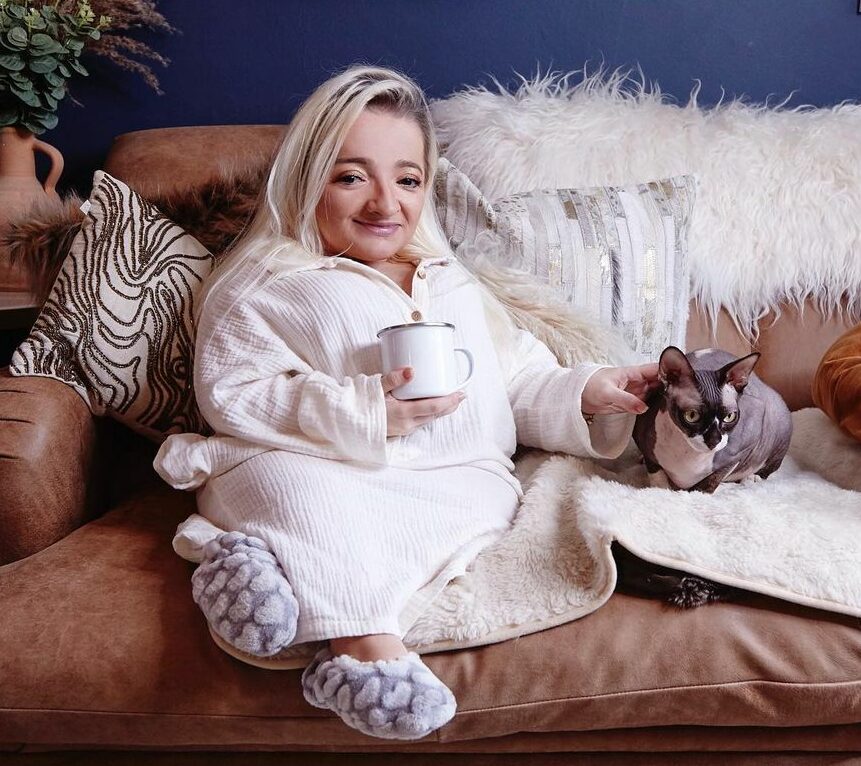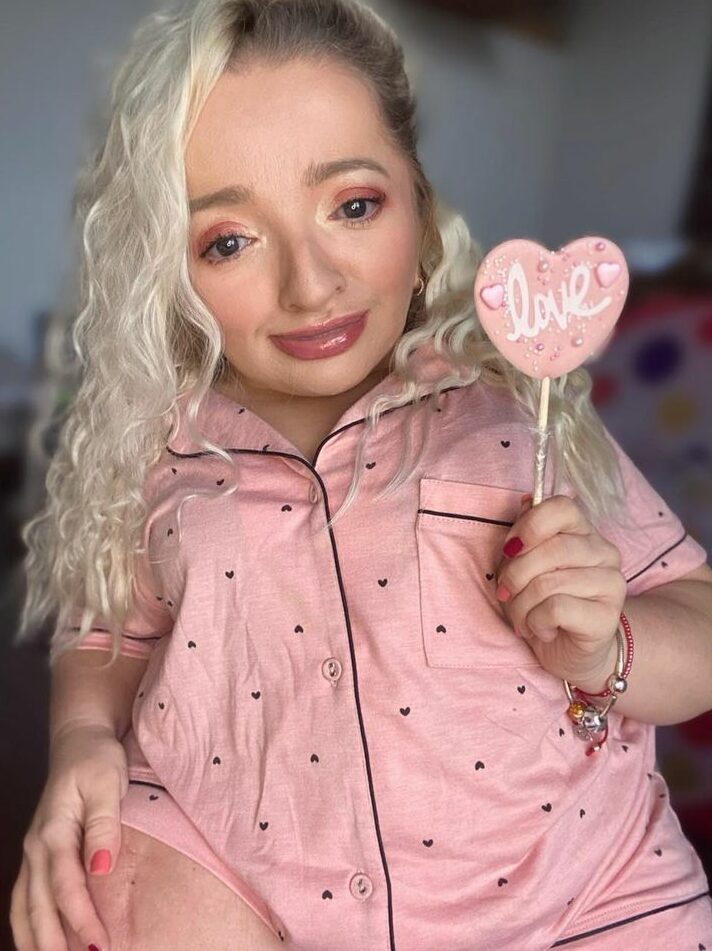

Fancy something positive in your inbox? Sign up
SURELY YOU CAN’T BE HAPPY AND ALONE? actress AND PRESENTER SAM RENKE SAYS BECOMING HER OWN BEST MATE HAS LED TO strength and success.
It often comes as a shock to most when I say I am at my happiest, sublimely content, sat at home with my furless fur babies, my two Sphynx cats, Lola and Bruno. We’ll be watching Buffy The Vampire Slayer for the zillionth time, eating pasta heaped with parmesan and some Reese’s Peanut Cups. Not at the same time — I’m not a savage!
Surely, you can’t be happy and alone? Two words rarely go hand in hand. So far removed from the positive associations of a people person, the life and soul of the party or a team player. Why does being in one’s own company often conjure up such negative connotations? If you aren’t labelled as ‘the weirdo loner’, then you are deemed as antisocial or, worse, a people hater — a grumpy Scrooge with a chip on your shoulder.
How often have we had that sly bitch about that one mate who seldom accepts an invite to come out and play? We often take it personally as though their declining our invite is a direct rejection, a sign they don’t want to be in our company.
 Or perhaps we can make the rather ignorant and ableist assumption that those who adopt a more solitary existence must be experiencing a mental-health crisis. They are alone because they are depressed. As someone who has lived with anxiety, PTSD and circumstantial depression for most of my life, I can categorically say that these conditions were very much alive and kicking when I was around other people — at school, university, my best friend’s wedding and down the chippy on a Friday night surrounded by drunken louts. (I only call them louts because I’m totally jealous that, nowadays, two sips of wine gets me pissed.)
Or perhaps we can make the rather ignorant and ableist assumption that those who adopt a more solitary existence must be experiencing a mental-health crisis. They are alone because they are depressed. As someone who has lived with anxiety, PTSD and circumstantial depression for most of my life, I can categorically say that these conditions were very much alive and kicking when I was around other people — at school, university, my best friend’s wedding and down the chippy on a Friday night surrounded by drunken louts. (I only call them louts because I’m totally jealous that, nowadays, two sips of wine gets me pissed.)
Spending time alone is often assumed to be a result of social circumstance rather than personal choice and we can almost make victims out of people, like me, who choose and even schedule in alone time. “Billy No-Mates, so sad they are on their own”. I mean, didn’t we once upon a time suspect and persecute hermits of witchcraft?
Well, I’m here to dispel that myth. Alone time isn’t something to feel sad about, rather it’s the greatest gift you can give yourself. In fact, becoming my own best mate has attributed to my strength and confidence. Even my success. I’ve come to the conclusion that I am both an introvert and extrovert. Often referred to as ‘ambivert’. On scienceofpeople.com., an ambivert is described as someone who exhibits qualities of both introversion and extroversion and can flip into either depending on their mood, context and goals.
That’s me in a nutshell. I can be on stage delivering a keynote presentation, in front of hundreds of strangers, and love every minute. The adrenaline, our natural high, occupies my body from head to toe. I simply love making people smile and laugh, and I truly believe I was born to do so. At that moment I’m authentically me, free from any self-doubt and even physical pain. As someone who has been in and out of hospital all my life, and taken a cocktail of pain meds, opioids and muscle relaxants over the years, I can categorically say that nothing compares to my own internal adrenaline elixir. Intoxicating and one-hundred-percent fulfilling. But the reality is I cannot be on stage twenty-four-seven. Nor would I want to be. This kind of happiness, this high, is fleeting and that’s okay.
 True, I love being the centre of attention, even for a brief moment, on television, on a film set or chatting to the random guy in the street who yells: “Oi, you’re on the telly”. But equally, I love my own company. I get just as much comfort, fulfillment and joy from pottering around my home. I mean even the word ‘pottering’ gives me a little tingle in my tummy.
True, I love being the centre of attention, even for a brief moment, on television, on a film set or chatting to the random guy in the street who yells: “Oi, you’re on the telly”. But equally, I love my own company. I get just as much comfort, fulfillment and joy from pottering around my home. I mean even the word ‘pottering’ gives me a little tingle in my tummy.
The pandemic allowed me to hone my introvert skills and I’ve found that I’m finding much more joy in my own space and thoughts. Naively, however, I assumed others were exactly like me. But quickly it became apparent that many of my friends really struggled with the lockdowns and I’m not ashamed to say I found it hard to show empathy. ‘Come on now, you’re a grown-ass adult, entertain yourself’ was often my kneejerk response. I was rather dismissive and initially not at all supportive.
Then it dawned on me: My ability to be comfortable in my own thoughts, daydreaming, spending hours sometimes in silence, left alone with my worries and insecurities — and still feel at peace — has taken a lifetime of practice. Being alone doesn’t scare me but I can now see how it can be incredibly intimidating to others. Now I totally appreciate that to achieve it takes practice, setting boundaries and self-awareness.
Nowadays, I choose alone time more frequently, but I am also forced to be in my own company due to factors outside of my control. I was born with a rare genetic condition called Osteogenesis imperfecta, more commonly known as brittle bones, and I am a full-time wheelchair user.
As a kid, I spent a heck of a lot of time in my own company. Growing up with a disability and with parents who were, shall we say, ‘overly-cautious’ meant that I really didn’t leave my house to play with friends or go on playdates and sleepovers. Add into the mix everyday discrimination, marginalisation and the disabling world at large, and it meant my life rarely exceeded the parameters of my bedroom, school or hospital.
It all sounds kind of sad but this isn’t one of those stories. In fact, in many ways, I’m bloody grateful for the time I had getting to know me. Being on my own, isolated, was put upon me — I didn’t have a choice — but, in many ways, I’ve seen it as a blessing.
You just had to step into my bedroom to see how my imagination came to life. Whole worlds, other dimensions resided next to my bed. Barbie, Skipper, Polly Pocket and Playmobile… Oh, not forgetting the Sylvanian Families. Each toy had its own identity and extensive backstory. I created my very own telenovella in my bedroom, with all the drama, the anguish. My creativity, my inner voice, my self-belief were all cultivated by me, on my own with my imagination. I never really felt alone. I mean, alone time wasn’t sad time. It was just another way of expressing myself and learning to grow.
I wasn’t born to be a victim and my solitude was never going to be my prison — rather I made it my salvation.
Learning to be content and at peace in my own company was my coping mechanism. My way of maintaining my autonomy over my life. It can be so easy to become frustrated and even angry at the barriers, both attitudinal and physical, in the world when you have a disability that you can start to view isolation and alone time as another form of ableist oppression — punishment for being disabled. I wasn’t born to be a victim and my solitude was never going to be my prison. Rather, I made it my salvation.
I am very much a people person. That’s the extrovert in me but I am also incredibly aware that whenever I am in a relationship, a love interest or a friendship, I give my all. A beautiful trait I’m sure you agree. Nevertheless, my desire to please others can be all-consuming and I have, in the past, lost myself and become totally swept up in living how someone wants me to live.
So, finding out what I want and need, by having a space that is my own and spending time getting to know me, has been a positive experience. Learning to enjoy life alone rather than be with the wrong person and having a beautiful life by myself has no less value. Actually, it has unburdened me from worrying about what the future may hold.
I do, however, bear in mind my own mental wellbeing when I spend long spells of alone time, especially during winter months or times when my health isn’t hunky-dory. Or the weather makes it even more treacherous to go out and about in a wheelchair. I tend to distance myself from the onslaught of tragic or negative news. Instead, I prefer to listen to podcasts or audiobooks. I’m not denying the importance of staying informed — as a broadcaster I have to be well-informed on the world and current affairs — but I am a true believer that we need to take breaks when necessary and also balance negative news with positive.

For me this is Ideal Home magazine, OK, sure, it’s not current affairs but having some tea and cake with the latest copy is absolutely food for my soul. It acts as joy, inspiration and a pacifier, and that time alone has become habitual and soothing.
Social media can absolutely be a cesspit of toxic images and content. Many wellbeing practitioners’ advice is to leave your mobile phone in a different room when you don’t need it. This is supposed to stop the temptation to reach for your phone and scroll aimlessly and to reduce screen time. This I find difficult, not from not wanting to be proactive but rather from necessity. My phone is a lifeline and emergency tool that I need by my side, even when I go to the loo. Living alone is a personal choice but living alone with a disability means you cannot have help there and then if you fall. So leaving my mobile out of sight seems like I’d be tempting fate.
However, I am a total Instagram fiend, and I am also the worst person for making comparisons online. I can absolutely feel the worst about myself from being on socials for too long. So if leaving my phone in a different part of my home isn’t an option, I have taken the new approach of filling up my social media feeds with uplifting content, like Happy Place and my mate Fearne Cotton. And the rest is mostly animals, cat protection, Woodgreen or Ferne animal sanctuaries. It’s all about balance and if seventy percent of my online world makes me smile, my mind doesn’t spiral negatively when I am in my own company and have no one to snap me out of my funk.
I guess being comfortable in your own company is rather relative and can be impacted by your cultural experience, who you are and where you come from. What might be right for one may not be for another and that’s the beauty and complexity of humans. I’m learning to live a life guided by my heart and my gut intuition. I choose to live alone and be in my own company more often because it’s what makes me happy.
I think we need to normalise this choice instead of perhaps assuming someone alone is bitter at the world, or is unlovable or incapable of letting others in. You aren’t selfish, you aren’t withdrawing from the world by spending time in your own company. In fact, you are taking time to learn what you need to be the best version of you and unleash that version into the world.
Pre-order Sam’s book here.